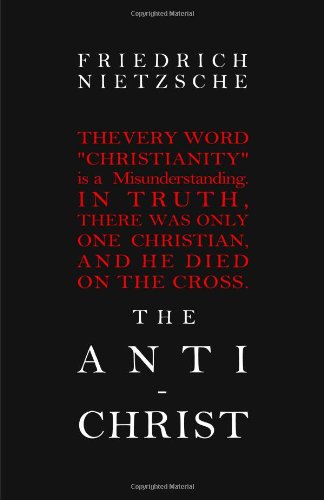
- ISBN13: 9781936594269
- Condition: New
- Notes: BRAND NEW FROM PUBLISHER! 100% Satisfaction Guarantee. Tracking provided on most orders. Buy with Confidence! Millions of books sold!
While the ! film's p lot, marked by chapters named after stages of grief, like "Pain" and "Despair," is rooted in absolute realism, the film's glorious moments are in its fantasy. There is a talking fox, subtle hints at ghostly occurrences, and many scenes that express the uncanny. Moreover, Gainsbourg's character, obsessed with witchcraft as it relates to historical gynocide and misogyny, adds much to the film's depressing sensibility that wallows unapologetically in decrepitude and faulty, negative reasoning. Dafoe, who plays the psychologist treating his hallucination-plagued wife, does a remarkable job depicting a person struggling through loss with logic. Antichrist works because Dafoe and Gainsbourg create archetypal characters, functioning symbolically as Logic and Psychosis in a Freudian maze with no exit. That said, the violent conclusions in the film's third chapter, "Despair (Gynocide)," are grim, graphic, and very difficult to watch. Antichrist, like its sister film in ! violence portrayed artfully, Irreversible, has all the more shock value because of the archetypal symbolism it successfully establishes. --Trinie DaltonLars von Trier (Europa, Breaking the Waves, Dancer in the Dark) shook up the film world when he premiered Antichrist at the 2009 Cannes Film Festival. In this graphic psychodrama, a grief-stricken man and womanâ€"a searing Willem Dafoe (Platoon, The Last Temptation of Christ) and Cannes best actress Charlotte Gainsbourg (Jane Eyre, 21 Grams)â€"retreat to a cabin deep in the woods after the accidental death of their infant son, only to find terror and violence at the hands of nature and, ultimately, each other. But this most confrontational work yet from one of contemporary cinema’s most controversial artists is no mere provocation. It is a visually sublime, emotionally ravaging journey to the darkest corners of the possessed human mind; a disturbing battle of the sexes that pits rational psychology against ag! e-old superstition; and a profoundly effective horror film.Lar! s von Tr ier's notorious Antichrist is a fascinating and extremely gruesome experiment that combines B-horror tropes with art film concepts and cinematography to question differences between high horror and low horror, if there are such categories. Like the best of Argento, namely Suspiria, Antichrist follows a strictly formulaic, minimalist, almost operatic script structure in which the story of a couple, played by Willem Dafoe and Charlotte Gainsbourg, grieve their dead son. The highly organized story, like a poem, has ample space for metaphors to form, dwell, and transform into overgrown mysteries, such as the decadent forest, Eden, where the couple retreat to their cabin to face demons. When the camera zooms in on a flower vase's murky water on the nightstand beside a bereft Gainsbourg, one senses the ensuing downward spiral.
While the film's plot, marked by chapters named after stages of grief, like "Pain" and "Despair," is rooted in absolute realism, t! he film's glorious moments are in its fantasy. There is a talking fox, subtle hints at ghostly occurrences, and many scenes that express the uncanny. Moreover, Gainsbourg's character, obsessed with witchcraft as it relates to historical gynocide and misogyny, adds much to the film's depressing sensibility that wallows unapologetically in decrepitude and faulty, negative reasoning. Dafoe, who plays the psychologist treating his hallucination-plagued wife, does a remarkable job depicting a person struggling through loss with logic. Antichrist works because Dafoe and Gainsbourg create archetypal characters, functioning symbolically as Logic and Psychosis in a Freudian maze with no exit. That said, the violent conclusions in the film's third chapter, "Despair (Gynocide)," are grim, graphic, and very difficult to watch. Antichrist, like its sister film in violence portrayed artfully, Irreversible, has all the more shock value because of the archetypal symbol! ism it successfully establishes. --Trinie DaltonHere is! Friedri ch Nietzsche's great masterpiece The Anti-Christ, wherein Nietzsche attacks Christianity as a blight on humanity. This classic is essential reading for anyone wishing to understand Nietzsche and his place within the history of philosophy. "We should not deck out and embellish Christianity: it has waged a war to the death against this higher type of man, it has put all the deepest instincts of this type under its ban, it has developed its concept of evil, of the Evil One himself, out of these instincts-the strong man as the typical reprobate, the 'outcast among men.' Christianity has taken the part of all the weak, the low, the botched; it has made an ideal out of antagonism to all the self-preservative instincts of sound life; it has corrupted even the faculties of those natures that are intellectually most vigorous, by representing the highest intellectual values as sinful, as misleading, as full of temptation. The most lamentable example: the corruption of Pascal, who beli! eved that his intellect had been destroyed by original sin, whereas it was actually destroyed by Christianity!" -Friedrich Nietzsche

 11:16 PM
11:16 PM
 Blog Fasion
Blog Fasion

